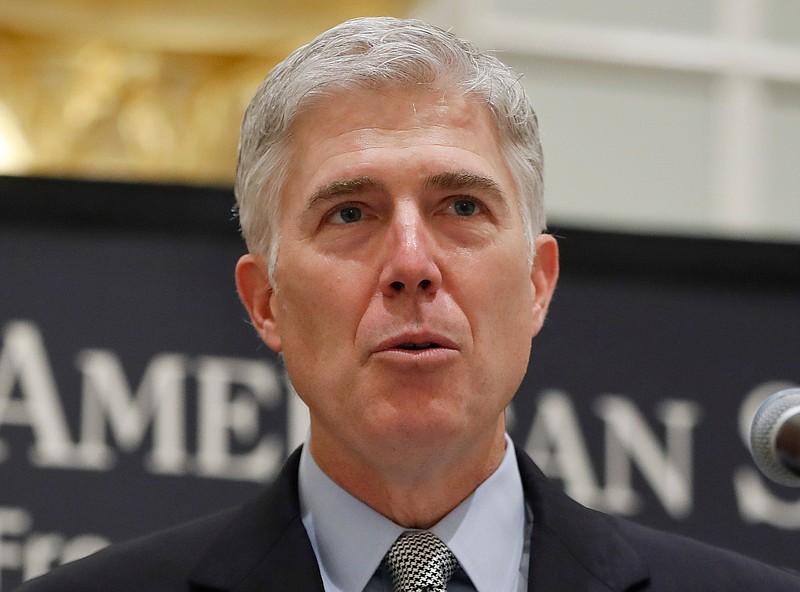If ever the Republican Senate did something wise in the waning months of President Barack Obama's presidency, it was to not hold a vote on the president's nomination of Merrick Garland to the United States Supreme Court in 2016.
Although then-Sen. Joe Biden had suggested Democrats do exactly the same thing 24 years earlier when a Republican was president, the move was seen as bad form by many.
Nevertheless, given last week's 5-4 decisions by the high court, with President Trump appointee Neil Gorsuch as a fifth vote, it is unfathomable what damage 5-4 decisions on the opposite side would have done to the country.
Indeed, without the hyperpartisan slant the court's leftist justices have taken, previous courts may have decided the same cases unanimously or at least lopsidedly.
-The one that generated the most interest was the decision upholding Trump's travel policy for residents of certain countries.
Presidents have had, and continue to have, as the court maintained, broad powers to control who is admitted to the United States. Those powers are strongest, the decision said, when the president is acting on national security grounds.
If ever in U.S. history there was a time when the president must be judicious in who is allowed to travel to the country, it is now when terrorists daily plot to strike us.
Trump, after all, was only singling out, in his original order, the same countries that President Obama and Congress did before him, as the court pointed out, and only after extensive work by the Cabinet.
The high court, as lower courts before it could not, separated the then-candidate's unwise words about Muslims with every president's need to keep the country safe. Any other decision reached in this case would have marked the court as purely political, as one that ruled based on the preference of the justices for the party or president in power.
-The decision that perhaps would have been the most egregious had it been decided the other way is one involving a California state law that demanded pro-life crisis pregnancy centers promote the opportunity for abortion.
In its ruling, the Supreme Court said the state's attempt violated First Amendment speech rights and amounted to government-coerced speech. A concurring opinion held that the law appeared intended to punish those with pro-life views.
The state law had required that signs be posted with specific wording, be a specific size and type, be displayed in a "clear and conspicuous" manner, be written in English and other "primary threshold languages" (12 in Los Angeles County), and be distributed in all clinic print and online advertising.
Had the law been allowed to stand, the possibilities for what might have come next are unimaginable - signs in grocery stores saying consumers should buy only what the state considered healthy food, signs in Christian counselors' offices warning that faith-based counseling might not agree with current state-favored counseling theory or mandatory warnings before conservative speakers that any words they might speak are not likely to be the accepted thoughts by those in state government.
"The people lose when the government is the one deciding which ideas should prevail," Justice Clarence Thomas wrote for the majority.
-A third decision said government workers no longer had to contribute to unions that represent them and with which they might disagree. It reversed a high court decision made in 1977 - at the height of political power of unions- which declared such workers were "free riders."
In 1954, 34.8 percent of all U.S. wage and salary workers belonged to unions, according to the Congressional Research Service. But by 1983, that had dropped to 20.1 percent and had fallen to 10.7 percent in 2017.
More than half the states already ban mandatory fees of employees, but unions argued that fees in the states that have them pay for collective bargaining and other benefits for all employees. But the Illinois state government worker who brought the suit said everything the union does - and statistics show nearly all of its contributions favor left-wing candidates and causes - is political.
"States and public-sector unions may no longer extract agency fees from nonconsenting employees," Justice Samuel Alito said, writing for the majority, noting the unfathomable "billions of dollars taken from non[union] members and transferred to public-sector unions in violation of the First Amendment. Those unconstitutional exactions cannot be allowed to continue indefinitely."
In all three cases, Obama's pick of Garland almost assuredly would have ruled differently from Gorsuch. And had Hillary Clinton won the presidency, as most of the nation expected, the retirement of Justice Anthony Kennedy on Wednesday and his subsequent replacement pick would have given the far left a 6-3 majority - and sometimes 7-2 with occasional votes from wobbly Chief Justice John Roberts.
Thanks to the Senate's action two years ago, the country dodged a dangerous bullet. Coming during the presidency of a man who ruled against the majority wishes of the people for eight years, it might have been a mortal bullet.
